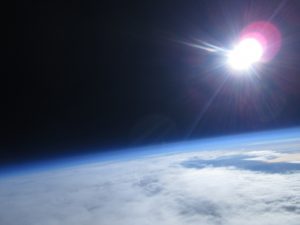Astronomical Events 2018

As 2018 begins, here is an overview of a few astronomical events to keep an eye out for:
January 31: A Blue Moon and Total Lunar Eclipse occurs on this day. A Blue Moon is the second full Moon in a single month. The cycle of the phases is 29.5 days, so in 11 out of 12 months it is possible to have two full moons in a month. Additionally, this full moon is going to be a Total Lunar Eclipse. Lunar Eclipses can only occur during full moons when the Sun, Earth, and Moon perfectly align. In Denver, the eclipse starts at 3:51am MST, peaks at 6:29am MST, and ends at 7:12am MST. At it’s peak the eclipse will cause the Moon to be a blood red color. This is due to sunlight being refracted through Earth’s atmosphere and illuminating the shadowed Moon.
February: This month will have no full moon, due to the phase cycle being 29.5 days, and February has only 28 days. February is the only month that this can happen in, and it happens about once every 20 years.
March 20: The March equinox is at 10:14am MDT. On this day, the Sun crosses the celestial equator. In Denver, it is our Vernal Equinox and is our first day of spring. This day will have equal amounts of day and night.
March 31: A Blue Moon occurs on this day. It is the second blue moon of the year.
April 22 & 23: The Lyrids Meteor Shower peaks during this time maxing at about 20 meteors per hour. The meteoroid particles come from the comet C/1861 G1 Thatcher. The radiant of this shower is in the constellation of Lyra.
May 6 & 7: The Eta Aquarius Meteor Shower peaks during this time maxing at about 30 meteors per hour. The meteoroid particles come from the comet Halley. The radiant of this shower is in the constellation Aquarius.
June 21: The June Solstice is at 4:07am MDT. In Denver on this day, the Sun reaches the highest daily maximum in the sky and has the most hours of sunlight. In Denver, is is our Summer Solstice and is our first day of summer.
July 28 & 29: The Delta Aquarids Meteor Shower peaks during this time maxing at about 20 meteors per hour. The meteoroid particles come from the comets Marsden and Kracht. The radiant of this shower is in the constellation Aquarius.
August 12 & 13: The Perseid Meteor Shower peaks during this time maxing at about 60 meteors per hour. The meteoroid particles come from the comet Swift-Tuttle. The radiant of this shower is in the constellation of Perseus.
September 22: The September Equinox is at 7:54pm MDT. On this day, the Sun crosses the celestial equator. In Denver, it is our Autumnal Equinox and is our first day of fall. This day will have equal amounts of day and night.
October 8: The Draconids Meteor Shower peaks during this time maxing at about 10 meteors per hour. The meteoroid particles come from the comet 21 Giacobini-Zinner. The radiant of this shower is in the constellation of Draco.
October 21 & 22: The Orionids Meteor Shower peaks during this time maxing at about 20 meteors per hour. The meteoroid particles come from the comet Halley. The radiant of this shower is in the constellation of Orion.
November 5 & 6: The Taurids Meteor Shower peaks during this time maxing at about 10 meteors per hour. The meteoroid particles come from the comet 2P Encke and asteroid 2004 TG10. The radiant of this shower is in the constellation of Taurus.
November 17 & 18: The Leonids Meteor Shower peaks during this time maxing at about 15 meteors per hour. The meteoroid particles come from the comet Tempel-Tuttle. The radiant of this shower is in the constellation of Leo.
December 13 & 14: The Geminids Meteor Shower peaks during this time maxing at about 120 meteors per hour. The meteoroid particles come from the asteroid 3200 Phaethon. The radiant of this shower is in the constellation of Gemini.
December 21: The December Solstice is at 3:23pm MDT. In Denver on this day, the Sun reaches the lowest daily maximum in the sky and has the least hours of sunlight. In Denver, is is our Winter Solstice and is our first day of winter.
December 21 & 22: The Ursids Meteor Shower peaks during this time maxing at about 10 meteors per hour. The meteoroid particles come from the comet Tuttle. The radiant of this shower is in the constellation of Ursa Minor. Enjoy Observing the Sky in 2018! Please join the ACC Astronomy Department on twitter by following @AstronomyatACC to learn of interesting astronomy news as well as events around campus.

